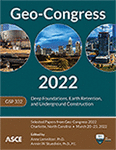Soil Classification and Feature Importance of EPBM Data Using Random Forests
Publication: Geo-Congress 2022
ABSTRACT
This paper presents an implementation of Random Forest (RF), a supervised learning algorithm, to classify the encountered geologic conditions using continuous earth pressure balance machine (EPBM) operation data. This study was performed on a data set from State Route 99 (SR99) tunnel construction in Seattle, WA. Hyperparameter tuning was performed to investigate the effects of RF hyperparameters on the classification performance as well as to determine the best hyperparameter configuration. The role of the features in the classification model was investigated by evaluating the feature importance measures. This study demonstrates that, with straightforward hyperparameter tuning, RF could deliver good classification performance and could infer the geologic transition through the classification probabilities. This study indicates that although several EPBM features had relatively larger “weights” for the classification, it was the interactions among the features that contain the geologic information.
Get full access to this article
View all available purchase options and get full access to this chapter.
REFERENCES
Breiman, L. (2001). “Random Forests.” Machine Learning, 45(1), 5–32.
Erharter, G. H., Marcher, T., and Reinhold, C. (2020). “Artificial Neural Network Based Online Rockmass Behavior Classification of TBM Data.” Information Technology in Geo-Engineering, Springer Series in Geomechanics and Geoengineering, A. G. Correia, J. Tinoco, P. Cortez, and L. Lamas, eds., Springer International Publishing, Cham, 178–188.
Garcia, G. R., Michau, G., Einstein, H. H., and Fink, O. (2021). “Decision support system for an intelligent operator of utility tunnel boring machines.” Automation in Construction, 131, 103880.
Geurts, P., Ernst, D., and Wehenkel, L. (2006). “Extremely randomized trees.” Machine Learning, 63(1), 3–42.
JSCE. (2016). Standard Specifications for Tunneling: Shield Tunnels. Japan Society of Civil Engineers.
Nicodemus, K. K., Malley, J. D., Strobl, C., and Ziegler, A. (2010). “The behaviour of random forest permutation-based variable importance measures under predictor correlation.” BMC Bioinformatics, 11(1), 110.
Probst, P., Wright, M. N., and Boulesteix, A.-L. (2019). “Hyperparameters and tuning strategies for random forest.” WIREs Data Mining and Knowledge Discovery, 9(3), e1301.
Sheil, B. B., Suryasentana, S. K., Mooney, M. A., and Zhu, H. (2020). “Machine Learning to Inform Tunnelling Operations: Recent Advances and Future Trends.” Proceedings of the Institution of Civil Engineers - Smart Infrastructure and Construction, 1–18.
Sousa, R. L., and Einstein, H. H. (2012). “Risk analysis during tunnel construction using Bayesian Networks: Porto Metro case study.” Tunnelling and Underground Space Technology, 27(1), 86–100.
Strobl, C., Boulesteix, A.-L., Kneib, T., Augustin, T., and Zeileis, A. (2008). “Conditional variable importance for random forests.” BMC Bioinformatics, 9(1), 307.
Sutcliffe, H. (1996). “Tunnel Boring Machines.” Tunnel Engineering Handbook, J. O. Bickel, T. R. Kuesel, and E. H. King, eds., Springer US, Boston, MA, 203–219.
Thewes, M., Budach, C., and Bezuijen, A. (2012). “Foam conditioning in EPB tunnelling.” Geotechnical Aspects of Underground Construction in Soft Ground, CRC Press Hoboken.
Wright, M. N., and Ziegler, A. (2017). “ranger: A Fast Implementation of Random Forests for High Dimensional Data in C++ and R.” Journal of Statistical Software, 77(1).
WSDOT. (2010a). Interim Report CT-6: Geologic Characterization., Prepared by Shannon & Wilson, Inc.
WSDOT. (2010b). Revised Geotechnical Baseline Report., Prepared by Parsons Brinckerhoff, Shannon & Wilson, Inc.
Zhang, Q., Liu, Z., and Tan, J. (2019). “Prediction of geological conditions for a tunnel boring machine using big operational data.” Automation in Construction, 100, 73–83.
Zhao, J., Shi, M., Hu, G., Song, X., Zhang, C., Tao, D., and Wu, W. (2019). “A Data-Driven Framework for Tunnel Geological-Type Prediction Based on TBM Operating Data.” IEEE Access, 7, 66703–66713.
Information & Authors
Information
Published In
History
Published online: Mar 17, 2022
Authors
Metrics & Citations
Metrics
Citations
Download citation
If you have the appropriate software installed, you can download article citation data to the citation manager of your choice. Simply select your manager software from the list below and click Download.
